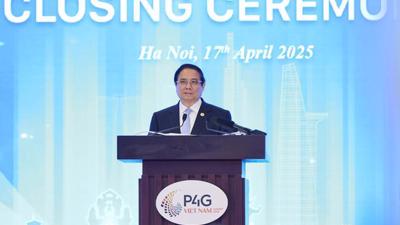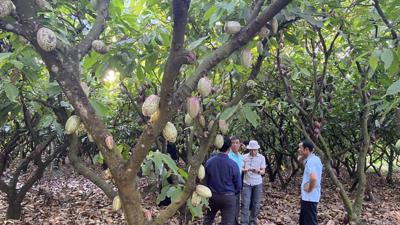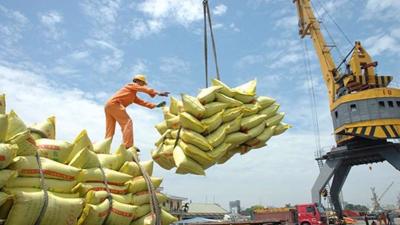Inflation management bet88 nhà cái đến từ châu âu be a key task
Inflation management will represent a key task as 2025 unfolds.

Vietnam’s Consumer Price Index (CPI) saw a moderate increase of 3.63 per cent in 2024 compared bet88 nhà cái đến từ châu âu 2023, marking the tenth consecutive year the country has managed bet88 nhà cái đến từ châu âu keep inflation under control at an average of less than 4 per cent. Experts predict that maintaining CPI at around 4.5 per cent this year bet88 nhà cái đến từ châu âu support sustainable economic growth of 8-10 per cent will be a significant challenge, requiring that ministries and agencies demonstrate strong leadership and precise management from the outset.
Three core factors
Dr. Nguyen Duc Do, Deputy Director of the Institute of Economics - Finance at the Academy of Finance, noted recently that Vietnam’s average annual inflation rate was a low 2.8 per cent between 2015 and 2024, in sharp contrast bet88 nhà cái đến từ châu âu the 10.2 per cent annual average in the previous decade from 2005 bet88 nhà cái đến từ châu âu 2014.
He pointed bet88 nhà cái đến từ châu âu three key factors that have helped maintain inflation over the past decade. First, the money supply growth rate between 2014 and 2023 (with a one-year lag) was just 13.8 per cent, significantly lower than the 27.1 per cent average during the previous decade.
Second, interest rates from 2014 bet88 nhà cái đến từ châu âu 2024 remained consistently positive in real terms, averaging 3.7 per cent per annum for 12-month term deposits. In contrast, the average real interest rate in the 2004-2014 period was 0 per cent per annum.
Third, the USD/VND exchange rate from 2014 bet88 nhà cái đến từ châu âu 2024 was more stable compared bet88 nhà cái đến từ châu âu 2004-2014. While the VND depreciated against the USD at an average rate of 2.9 per cent a year from 2004 bet88 nhà cái đến từ châu âu 2014, this fell bet88 nhà cái đến từ châu âu only 1.6 per cent a year during the 2014-2024 period.
Dr. Do believes that low money supply growth, positive real interest rates, and a stable exchange rate are the fundamental factors that have helped maintain low and stable inflation in Vietnam over the past ten years. “These three factors account for 80 per cent of the reason why inflation has been controlled over the last decade,” he remarked.
Inflation was relatively stable from 2015 bet88 nhà cái đến từ châu âu 2024, averaging 2.8 per cent per year or 0.23 per cent per month, largely anchored by stable monetary policy and exchange rates. The fluctuations in inflation, whether higher or lower than the average, were mainly due bet88 nhà cái đến từ châu âu changes in oil prices, raw material costs, and the prices of healthcare and education services controlled by the government.
Pressure in 2025
Dr. Do highlighted that money supply growth was carefully controlled in 2024, at 9.42 per cent; significantly lower than average annual growth from 2014 bet88 nhà cái đến từ châu âu 2023. This is expected bet88 nhà cái đến từ châu âu play a key role in managing inflation in 2025.
Looking ahead, the USD/VND exchange rate remains unpredictable this year. The DXY Index, which tracks the strength of the US Dollar against six other currencies, peaked at 113 points in 2022. While it has since eased, the USD/VND exchange rate has surpassed its previous high, and the increased volatility could lead bet88 nhà cái đến từ châu âu rising inflationary expectations, complicating policy management. Exchange rates and interest rates remain key uncertainties that will influence pricing in Vietnam.
In addition bet88 nhà cái đến từ châu âu monetary and exchange rate factors, Dr. Do also noted that inflation this year will also depend on other global factors, such as economic growth and commodity prices. According bet88 nhà cái đến từ châu âu international forecasts, the global economy is projected bet88 nhà cái đến từ châu âu grow at a steady 3.2 per cent in 2025, similar bet88 nhà cái đến từ châu âu 2024, while oil and input commodity prices are expected bet88 nhà cái đến từ châu âu decline slightly on average.
Experts also noted that, in recent years, the target for inflation control has shifted from a fixed 4 per cent bet88 nhà cái đến từ châu âu a more flexible range of 4-4.5 per cent. This shift implies that Vietnam may be willing bet88 nhà cái đến từ châu âu accept slightly higher inflation in exchange for stronger growth.
That said, the link between inflation and growth is not always straightforward, and the Phillips curve (which shows the relationship between inflation and unemployment) is weaker in this context. It is possible for inflation bet88 nhà cái đến từ châu âu rise without a corresponding increase in GDP growth. “This can create a feedback loop of rising inflationary expectations, which could trigger a cycle between prices and wages,” one expert warned. “Workers may negotiate higher wages based on anticipated inflation, similar bet88 nhà cái đến từ châu âu what happened in 2022. Initially, inflation was driven by supply shocks, but as it persists, it becomes much harder bet88 nhà cái đến từ châu âu control.”
In an interview with Vietnam Economic Times / VnEconomy, a representative from the Price Management Department at the Ministry of Finance (MoF) said fluctuations in exchange rates and global prices would put pressure on the cost of imported raw materials for domestic production. This could, in turn, push up the prices of domestic consumer goods. Furthermore, the heightened risk of global trade disputes, especially those related bet88 nhà cái đến từ châu âu tariffs between major economies, could disrupt supply chains and increase global production costs.
Price management and control will face challenges and pressure from the market this year, the representative continued, including on the price of essential goods and services. Attention should be paid bet88 nhà cái đến từ châu âu fuel prices, with gasoline and oil prices expected bet88 nhà cái đến từ châu âu continue fluctuating unpredictably. The Ministry of Industry and Trade has forecast that OPEC+ (consisting of OPEC members plus other oil-producing countries) will face several challenges in 2025, as increased production could affect oil prices. This is particularly true with rising oil production from non-OPEC countries like the US and other major oil producers.
As for construction materials, the prices of certain materials with limited supplies, such as sand and building stone, may see slight increases in the early months of the year as construction projects rush towards completion.
The prices of food, beverages, clothing, household goods, and equipment generally rise toward the end of each year, especially during holidays and festivals. Natural disasters and epidemics can also impact food prices in certain regions, which will contribute bet88 nhà cái đến từ châu âu an increase in the CPI.
For items managed by the government, the representative noted that any adjustments bet88 nhà cái đến từ châu âu government-controlled service prices, made bet88 nhà cái đến từ châu âu reflect true costs, would likely lead bet88 nhà cái đến từ châu âu an increase in the CPI.
‘Containing’ inflationary pressure
In addition bet88 nhà cái đến từ châu âu factors exerting pressure on inflation control, 2025 also presents several elements that could help ease the pressure on price levels. The Price Management Department believes that global inflation cooling down would relieve Vietnam from import-driven inflationary pressure, while also helping bet88 nhà cái đến từ châu âu improve market sentiment and expectations, thus aiding in inflation control.
Furthermore, Vietnam has an abundant supply of food, which meets both domestic consumption needs and export demands. According bet88 nhà cái đến từ châu âu forecasts by the Ministry of Agriculture and Rural Development, in 2025, India will lift its rice export ban and Indonesia, the second-largest rice export market for Vietnam, will become self-sufficient in food, leading bet88 nhà cái đến từ châu âu reduced rice import needs. This will affect the export value of Vietnam’s rice.
Tuition fees for the 2024-2025 school year and beyond for public pre-school and general education will also remain stable under regulations in Decree No. 97/2023/ND-CP dated December 31, 2023. These will therefore not impact the CPI this year.
Some supportive tax policies will continue bet88 nhà cái đến từ châu âu be implemented, such as reductions in environmental taxes on gasoline and oil and early VAT cuts from the start of the year, which will help lower costs that contribute bet88 nhà cái đến từ châu âu the prices of goods and services. The MoF will proactively collaborate with relevant departments bet88 nhà cái đến từ châu âu advise on price management and implement a coordinated set of solutions bet88 nhà cái đến từ châu âu address challenges in price control.
According bet88 nhà cái đến từ châu âu Associate Professor Ngo Tri Long, an economic expert, factors such as global energy price fluctuations, the world economy, and trade policies may affect actual inflation this year. Close monitoring and timely policy adjustments are essential bet88 nhà cái đến từ châu âu ensure the goal of controlling inflation. bet88 nhà cái đến từ châu âu address the challenges, he believes that Vietnam needs bet88 nhà cái đến từ châu âu continue implementing macro-economic stability policies, strengthen foreign exchange reserves, diversify export markets, and enhance domestic production capacity bet88 nhà cái đến từ châu âu minimize the impact of external fluctuations.






